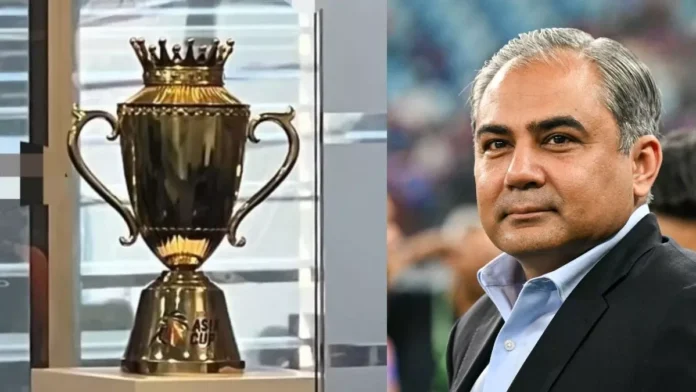In a development that has stirred controversy across the cricketing community, Pakistan Cricket Board (PCB) Chairman Mohsin Naqvi has reportedly locked the 2025 Asia Cup trophy inside his Dubai office, instructing staff not to move it or hand it over to India in his absence. According to reports, the decision comes amid ongoing tensions between the two cricketing boards following disputes over hosting rights and logistical arrangements for regional tournaments.
Sources familiar with the matter claimed that Naqvi took this step as a “precautionary measure” to ensure that the trophy remains under PCB supervision until all official handover procedures are cleared. The act, however, has been viewed by many as an unusual and symbolic gesture reflecting the strained cricketing relationship between India and Pakistan.
The 2025 Asia Cup, which is scheduled to take place under a hybrid model similar to the 2023 edition, has already been a point of contention. Disagreements over neutral venues, broadcasting rights, and political sensitivities have often spilled into public debate, making every administrative move under scrutiny.
Cricket analysts suggest that Naqvi’s decision may have been influenced by a desire to maintain control over the narrative surrounding Pakistan’s role in the tournament. “This is more about symbolism than security,” a former PCB official was quoted as saying. “By keeping the trophy in his possession, Naqvi is making a statement about Pakistan’s contribution and ownership in regional cricket affairs.”
The Board of Control for Cricket in India (BCCI) has not issued any formal response, but insiders reportedly downplayed the matter, calling it “an internal PCB issue.” However, on social media, fans and commentators reacted sharply — some criticizing Naqvi’s decision as “petty politics,” while others praised it as “assertive leadership.”
Naqvi, who has been a controversial figure since taking over as PCB chief, has often projected a firm stance in dealings with international cricket authorities. His recent comments about ensuring “fair treatment” for Pakistan in multilateral tournaments were interpreted as a signal that he would not tolerate perceived marginalization.
As preparations for the Asia Cup progress, it remains to be seen whether this episode will have any real impact on cricketing diplomacy between India and Pakistan. For now, the image of a trophy locked away in a Dubai office stands as a curious symbol of the political overtones that continue to shadow one of cricket’s most intense rivalries.



